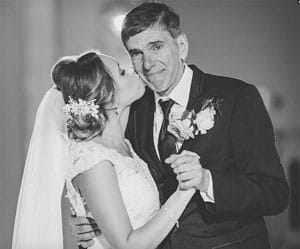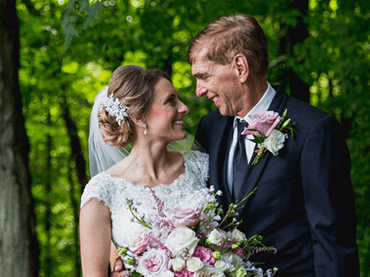On a pleasant fall day, Steve Wenzel, a retired school teacher, was busy getting his outside chores done knowing the winter months would soon be upon us. He had just finished cleaning the leaves out of the gutters at his father’s house next door, and decided to do the same at his home.
“Steve told his father he was going home to start the gutter’s on our house,” Rosellen, Steve’s wife, explained. “His father said he would meet him to help in 10 minutes.”
During the 10 minutes before his father made it to Steve’s house, something tragic happened. His father found Steve on the driveway unresponsive — he had fallen from the ladder.
“My father called 911,” Steve says. “He wasn’t there when I fell, but he knew I wasn’t alone for more than 15 minutes.”
Traumatic Injuries
Steve was transported by air to a local trauma center where it was determined he had a broken hip and femur, as well as a traumatic brain injury. For the next 24 hours, Steve fought for his life. He had extensive surgery to repair his leg and hip and had to be put on a ventilator. When he woke up, Steve recognized his family members, but not much else.
The Long Road to Recovery
Steve’s family understood that his hip and leg would heal, but they were learning more about the devastating impact a traumatic brain injury can have on a person. Traumatic brain injuries are very complex; symptoms and recovery are different for everyone and can affect you physically, psychologically, and socially. Brain injuries can affect your ability to think, to communicate, and even connect with other people.
Rosellen recalls, “We knew he needed more care but Steve’s biggest fear has always been going to a nursing home. We wanted to make sure he was in the right place, so a social worker talked to us about inpatient rehabilitation at UPMC Williamsport."
Having lived in Williamsport their entire lives, Steve and Rosellen knew about the inpatient rehabilitation program, once referred to as Gibson Rehab. They were happy knowing he would be at a place they had heard good things about and was close to their home.
Learning Simple Tasks All Over Again
When Steve arrived at UPMC Williamsport, he recognized his family, but he forgot so much — basic things like color and numbers were not familiar to him.
“Someone had to be with Steve 24/7 because of his brain injury,” Rosellen says. “Everyone at inpatient rehabilitation was amazing. They reminded us Steve might get better, but he may never be the same. Every day and he was slowly getting better, stronger, and he was remembering more.”

His Daughter’s Wedding
Steve continued to work hard with a goal in sight—an upcoming wedding. Steve’s daughter Melissa got engaged two weeks before Steve’s fall. After arriving at UPMC Williamsport, the family discussed moving the wedding date until they were sure that Steve would be able to walk her down the aisle. But Steve had other plans—he wouldn’t let them change the date.
“Planning the wedding kept us all going,” says Rosellen. “It was a stressful time, but we were all looking forward to the wedding.”
Retraining His Body and Mind
Steve worked very hard with his physical, occupational, and speech therapists during his inpatient rehabilitation. After six weeks, he was discharged to continue his therapy at home. He began treatment in a wheelchair and slowly progressed to a walker, then a cane, and was finally walking on his own. His word recognition got better every day and he began remembering big moments in life like his wedding and the birth of his daughter.
“Our therapists were always guardedly optimistic,” says Steve. “I would get frustrated at times, but everyone treated me very well. They were very kind—they were just good people.”
Rosellen says, “They not only treated every aspect of Steve’s needs, they cared about the whole family.”
Returning to Normal Living
“As Steve got stronger there was no doubt in our minds that he would be walking Melissa down the aisle. There wasn’t a dry eye at the wedding,” remembers Rosellen.
Steve is back doing the things he loves—working at the Salvation Army, working out at the YMCA, officiating basketball games, and walking. Steve and his daughter attend the stroke and head injury survivors support group at UPMC regularly and the whole family tries to teach everyone never to climb ladders alone.
Rosellen laughs, “I think he remembers more than I do now, he is 99.9 percent back to himself.”

















